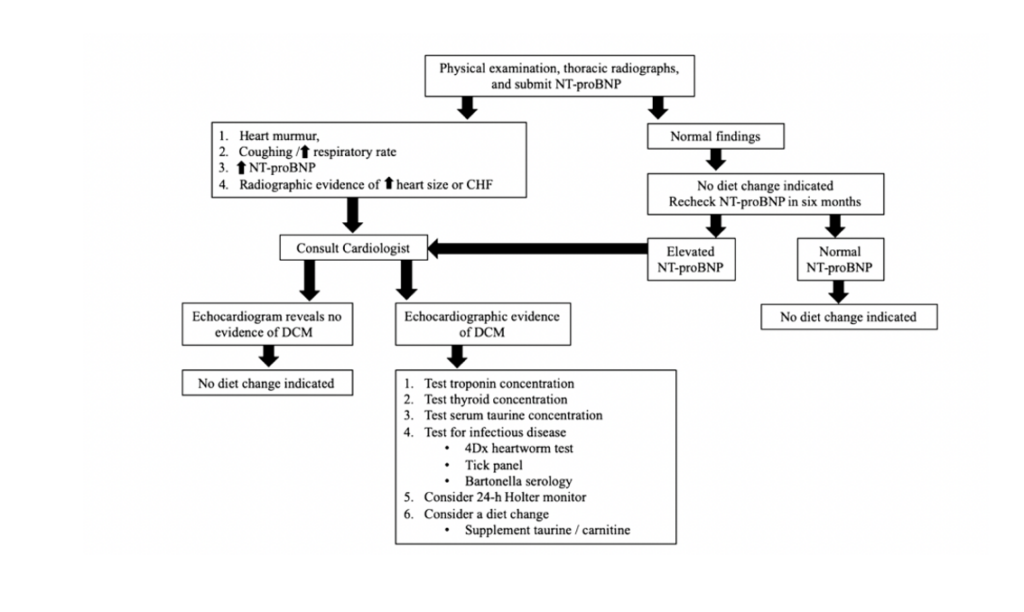Non-traditional Diets and DCM Update:
Dilated cardiomyopathy (DCM) is a devastating disease of the heart muscle which causes the heart to become enlarged with poor pumping function. It is the second most common heart disease in the dog with chronic degenerative valve disease representing 75% of cardiovascular disease in this species. Primary DCM is presumed to be hereditary in large and giant breed dogs (i.e. Great Danes, Doberman Pinschers, Boxers). It is progressive over a relatively short time course, often resulting in congestive heart failure or fatal arrhythmias. Alternatively, secondary DCM can be caused by certain medications, infectious diseases, endocrine disorders or diet. If the inciting cause of secondary DCM is identified and corrected, the heart can remodel for the better, often returning to normal size and function.
Diet-associated DCM in dogs eating non-traditional diets was first reported to the public by the FDA in July 2018. Since that time, over 1,300 affected dogs have been reported to the FDA, with many other dogs being diagnosed with the disease but not officially reported. Although we have not yet identified the specific causative agent in these non-traditional diets, veterinary cardiologists and nutritionists have made significant progress towards an answer over the past 4.5 years of intensive research.
Research has shown that non-traditional diets are commonly grain-free formulas that contain pulses (peas, lentils, chickpeas and dry beans) and potatoes as primary ingredients. These studies have determined that it is not the lack of grains in these diets or even a certain deficiency (i.e. lack of taurine or carnitine) that causes heart disease. Even grain-inclusive diets with pulses as the primary ingredient have been linked to the development of DCM in some patients. Instead, pulses (especially peas) seem to be the most likely culprit, acting like a toxic agent to the heart muscle over time. Laboratory studies have shown progressive left ventricular enlargement and weaker contraction of the heart in healthy dogs fed these non-traditional legume-rich diets. More advanced metabolomic studies are underway to determine the causative mechanism in pulse ingredients.
A recent review article published a helpful decision tree infographic as a veterinary guideline for managing diet concerns for pets with and without clinical signs of cardiac disease (Figure 1, Source 4).

It’s important to remember that diet-associated DCM is a not a binary diagnosis; it is a spectrum of disease. In fact, some dogs eating non-traditional diets will never even develop cardiac abnormalities. In dogs with the disease, some can be mildly affected with rapid remodeling of the heart on a new, appropriate diet; others can be severely affected with cardiac remodeling taking over a year to complete or heart function never completely returning to normal and requiring lifelong medications. In general, however, dogs with diet-associated DCM have a much better long-term prognosis after a diet switch than dogs with primary DCM.
Cardiac Supplement Quick Facts:
Which supplements may benefit heart health is a common question posed by owners when their dog is diagnosed with cardiac disease. There is overwhelming evidence supporting omega-3 fatty acid supplementation in dogs with cardiac disease. It imparts anti-inflammatory effects, improves myocardial energy metabolism and helps to mitigate the loss of lean body mass from cardiac cachexia.
Taurine and Carnitine are two amino acids that also benefit the heart through increased myocardial contractility and maintained myocardial energy production, respectively. Most recently, medium chain fatty acids (MCFAs) are a supplement in the spotlight due to their help in improving cardiac function and providing a key energy source for the failing heart. There are newer cardiac-specific diets on the market by Purina and Hill’s that are cardiac supplement-inclusive and have shown potential promise at slowing heart disease progression in our canine patients.
Take Home Points:
-Pulses, predominantly peas, are the likely inciting agent of dilated cardiomyopathy in non-traditional diets. Even grain-inclusive diets can contain a high percentage of pulses, so always check the full ingredient list on the diet when determining if the diet needs to be switched.
-The causative agent in pulses has not yet been identified, but current research is taking a more advanced approach at the diet question by evaluating metabolomic signatures in both healthy and diseased dogs eating non-traditional vs. traditional diets.
-Cardiac diets fortified with supplements including Omega-3 fatty acids, MCFAs, taurine and carnitine have shown promise at potentially slowing valve disease progression in dogs with more data forthcoming.
Sources:
- Freeman, L. Diet-associated dilated cardiomyopathy: the cause is not yet known but it hasn’t gone away. vetnutrition.tufts.edu. February 2023.
- Walker AL, DeFrancesco TC, Bonagura JD et al. Associated of diet with clinical outcomes in dogs with dilated cardiomyopathy and congestive heart failure JVC 2022.
- Smith CE, Parnell LD, Lai C-Q, et al. Metabolomic profiling in dogs with dilated cardiomyopathy eating non-traditional or traditional diets and in healthy controls. Sci Rep 2022.
- McCauley SR, Clark SD, Quest BW, Streeter RM, Oxford EM. Review of canine dilated cardiomyopathy in the wake of diet-associated concerns. JAS 2020.
- Freeman et al. Beneficial effects of omega-3 fatty acids in cardiovascular disease. JSAP 2010.
- Saifudeen I, Subhadra L, Konnottil R, et al. Metabolic modulation by medium-chain triglycerides reduces oxidative stress and ameliorates CD-36-mediated cardiac remodeling in spontaneously hypertensive rate in the initial and established stages of hypertrophy. JCF 2017.
- Li Q, Heaney A, Langenfeld-McCoy N, et al. Dietary intervention reduces left atrial enlargement in dogs with early preclinical myxomatous mitral valve disease: a blinded randomized controlled study in 36 dogs. BMC Veterinary Research. 2019.

